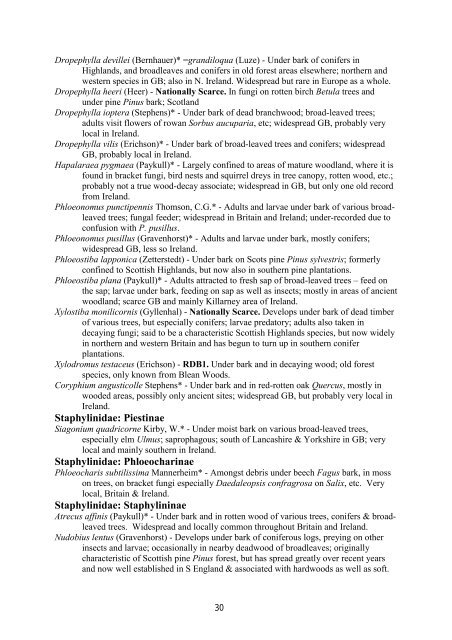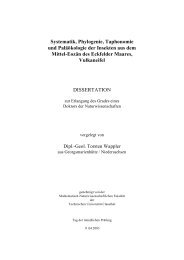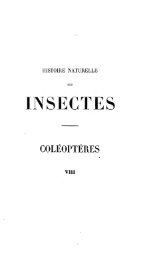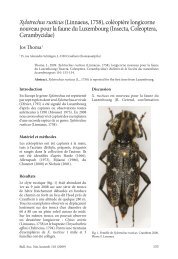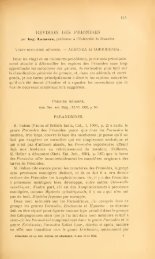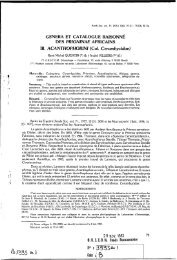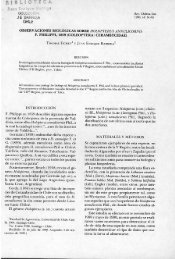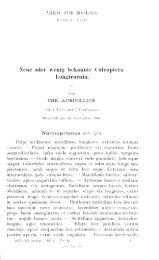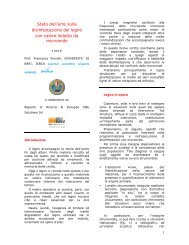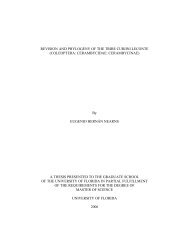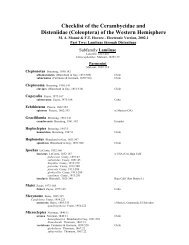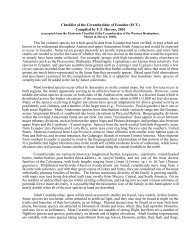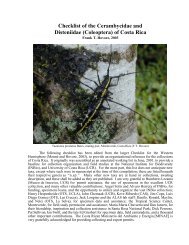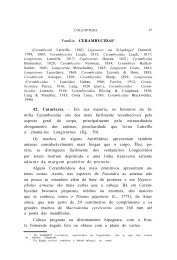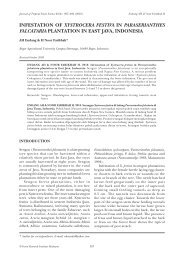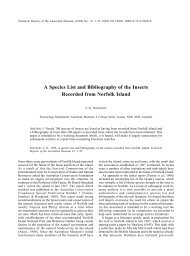Crustacea: Copepoda - Cerambycoidea.com
Crustacea: Copepoda - Cerambycoidea.com
Crustacea: Copepoda - Cerambycoidea.com
You also want an ePaper? Increase the reach of your titles
YUMPU automatically turns print PDFs into web optimized ePapers that Google loves.
Dropephylla devillei (Bernhauer)* =grandiloqua (Luze) - Under bark of conifers in<br />
Highlands, and broadleaves and conifers in old forest areas elsewhere; northern and<br />
western species in GB; also in N. Ireland. Widespread but rare in Europe as a whole.<br />
Dropephylla heeri (Heer) - Nationally Scarce. In fungi on rotten birch Betula trees and<br />
under pine Pinus bark; Scotland<br />
Dropephylla ioptera (Stephens)* - Under bark of dead branchwood; broad-leaved trees;<br />
adults visit flowers of rowan Sorbus aucuparia, etc; widespread GB, probably very<br />
local in Ireland.<br />
Dropephylla vilis (Erichson)* - Under bark of broad-leaved trees and conifers; widespread<br />
GB, probably local in Ireland.<br />
Hapalaraea pygmaea (Paykull)* - Largely confined to areas of mature woodland, where it is<br />
found in bracket fungi, bird nests and squirrel dreys in tree canopy, rotten wood, etc.;<br />
probably not a true wood-decay associate; widespread in GB, but only one old record<br />
from Ireland.<br />
Phloeonomus punctipennis Thomson, C.G.* - Adults and larvae under bark of various broadleaved<br />
trees; fungal feeder; widespread in Britain and Ireland; under-recorded due to<br />
confusion with P. pusillus.<br />
Phloeonomus pusillus (Gravenhorst)* - Adults and larvae under bark, mostly conifers;<br />
widespread GB, less so Ireland.<br />
Phloeostiba lapponica (Zetterstedt) - Under bark on Scots pine Pinus sylvestris; formerly<br />
confined to Scottish Highlands, but now also in southern pine plantations.<br />
Phloeostiba plana (Paykull)* - Adults attracted to fresh sap of broad-leaved trees – feed on<br />
the sap; larvae under bark, feeding on sap as well as insects; mostly in areas of ancient<br />
woodland; scarce GB and mainly Killarney area of Ireland.<br />
Xylostiba monilicornis (Gyllenhal) - Nationally Scarce. Develops under bark of dead timber<br />
of various trees, but especially conifers; larvae predatory; adults also taken in<br />
decaying fungi; said to be a characteristic Scottish Highlands species, but now widely<br />
in northern and western Britain and has begun to turn up in southern conifer<br />
plantations.<br />
Xylodromus testaceus (Erichson) - RDB1. Under bark and in decaying wood; old forest<br />
species, only known from Blean Woods.<br />
Coryphium angusticolle Stephens* - Under bark and in red-rotten oak Quercus, mostly in<br />
wooded areas, possibly only ancient sites; widespread GB, but probably very local in<br />
Ireland.<br />
Staphylinidae: Piestinae<br />
Siagonium quadricorne Kirby, W.* - Under moist bark on various broad-leaved trees,<br />
especially elm Ulmus; saprophagous; south of Lancashire & Yorkshire in GB; very<br />
local and mainly southern in Ireland.<br />
Staphylinidae: Phloeocharinae<br />
Phloeocharis subtilissima Mannerheim* - Amongst debris under beech Fagus bark, in moss<br />
on trees, on bracket fungi especially Daedaleopsis confragrosa on Salix, etc. Very<br />
local, Britain & Ireland.<br />
Staphylinidae: Staphylininae<br />
Atrecus affinis (Paykull)* - Under bark and in rotten wood of various trees, conifers & broadleaved<br />
trees. Widespread and locally <strong>com</strong>mon throughout Britain and Ireland.<br />
Nudobius lentus (Gravenhorst) - Develops under bark of coniferous logs, preying on other<br />
insects and larvae; occasionally in nearby deadwood of broadleaves; originally<br />
characteristic of Scottish pine Pinus forest, but has spread greatly over recent years<br />
and now well established in S England & associated with hardwoods as well as soft.<br />
30


